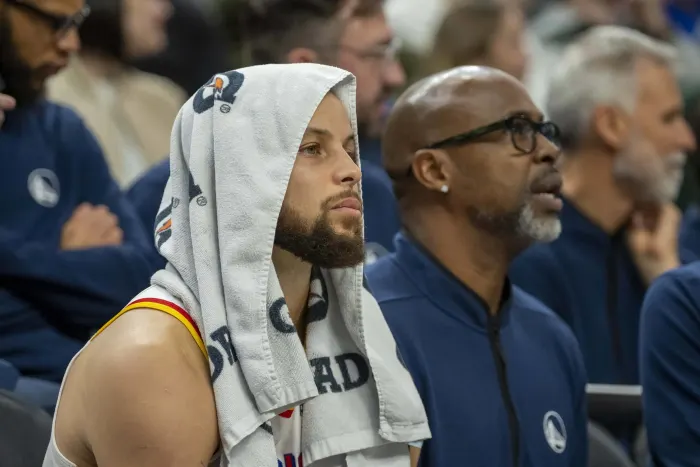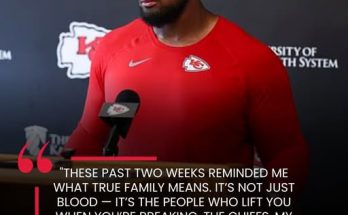The Golden State Warriors, led by superstar Stephen Curry, have long been a beacon of excellence in the NBA, a team that has redefined modern basketball with its unparalleled shooting and teamwork. However, even for a dynasty as storied as the Warriors, challenges arise, particularly in maintaining their championship-contending status. Recently, Curry emphasized that the team must avoid making any “desperate” moves, a sentiment that offers insight into his mindset as both a leader and competitor.
A Calm Voice Amid Uncertainty
In a league driven by player movement and rapid roster changes, the Warriors have stood out for their loyalty to their core group. Curry’s comments underscore his belief in the current roster’s potential and his confidence in the organization’s long-term vision. “We’ve built something special here, and we’ve done it by staying true to who we are,” Curry remarked during a recent press conference. “Making a desperate move goes against everything we’ve established.”
The Warriors’ front office, led by general manager Mike Dunleavy Jr. and head coach Steve Kerr, has faced growing pressure to ensure the team remains competitive. With a mix of seasoned veterans like Draymond Green and Klay Thompson alongside promising young talents such as Jonathan Kuminga and Moses Moody, the team sits at a crossroads. The question becomes: how do they balance short-term success with long-term sustainability?
The Context Behind Curry’s Statement
Curry’s comments come amidst speculation that the Warriors might consider significant trades to address gaps in their roster. The team’s uneven performance this season has sparked debates among fans and analysts about whether a blockbuster trade is necessary. Critics argue that Golden State’s bench lacks the depth required to compete with top-tier teams, while others believe their current core has enough firepower to make another title run.
Curry’s insistence on avoiding rash decisions reveals his faith in the organization’s strategic planning. “I’ve been here long enough to know that success doesn’t come overnight,” he said. “It’s about building, learning, and growing.”
Lessons from Past Moves
The Warriors’ history offers valuable lessons about the perils and rewards of roster adjustments. The acquisition of Kevin Durant in 2016 is often cited as a masterstroke, propelling the team to two championships. Conversely, the trade for D’Angelo Russell in 2019, which was later flipped for Andrew Wiggins, highlighted the risks of making moves that don’t align with the team’s culture.
Curry’s call for patience reflects an understanding of these dynamics. Desperation often leads to decisions that prioritize immediate gains over sustainable growth, which could disrupt team chemistry. “We’ve seen what happens when you rush things,” Curry noted. “You lose sight of the bigger picture.”
The Warriors’ Current Challenges
Golden State’s 2024 season has been marked by inconsistency, with injuries to key players and fluctuating performances from the bench. While Curry continues to deliver MVP-caliber performances, averaging over 30 points per game, the team’s defensive lapses and lack of secondary scoring have been glaring issues.
Veterans like Green and Thompson remain integral to the Warriors’ identity, but age and injuries have inevitably taken their toll. Meanwhile, younger players like Kuminga, Moody, and James Wiseman (before his departure) have faced scrutiny for not meeting expectations quickly enough. The tension between developing these players and maximizing Curry’s prime years creates a complex scenario for the front office.
Balancing Patience and Urgency
While Curry’s stance against desperation is clear, it doesn’t mean he’s against all changes. “There’s a difference between being proactive and being desperate,” he explained. “You make moves that make sense, not ones that come from panic.”
This nuanced perspective is crucial as the Warriors evaluate their options. Potential trades could bring in veteran talent to address immediate needs, but such moves must align with the team’s overarching philosophy. For instance, acquiring a player who complements Curry’s skill set without sacrificing the team’s future assets would be ideal.
The Role of Leadership
Curry’s comments also highlight his leadership qualities. As the face of the franchise, his perspective carries significant weight, both in the locker room and the front office. “Steph is the heartbeat of this team,” Green said in a recent interview. “When he speaks, we listen.”
His approach mirrors that of other legendary players who have advocated for stability during turbulent times. Whether it’s Tim Duncan’s quiet confidence with the San Antonio Spurs or LeBron James’ calculated input on roster moves, Curry’s voice reflects a deep understanding of what it takes to build and maintain a championship culture.
The Fan Perspective
For fans, Curry’s comments may provide reassurance amid a sea of trade rumors and speculative headlines. Warriors supporters have grown accustomed to seeing their team make savvy decisions, and Curry’s confidence in the organization’s direction reinforces their trust.
“Steph’s right,” said a long-time Warriors fan on social media. “We don’t need to panic. We’ve got the best shooter in history, and we’re still in the mix.”
However, patience can be a tough sell for fans eager to see their team return to championship glory. Balancing expectations while maintaining the integrity of the team’s vision is a challenge the Warriors have navigated before and will continue to face.
Looking Ahead
As the trade deadline approaches, the Warriors’ decisions will undoubtedly be scrutinized. Curry’s comments serve as a reminder of the importance of perspective in a high-stakes environment. While the team’s front office evaluates potential moves, Curry’s steady presence ensures that the Warriors remain grounded.
“We’re not just trying to win this season,” Curry emphasized. “We’re building something that lasts.”
This long-term outlook may not always align with the immediacy of professional sports, but it’s a philosophy that has brought the Warriors sustained success. By resisting the temptation to make hasty decisions, Golden State keeps its focus on the ultimate goal: creating a legacy that transcends individual seasons.
Conclusion
Stephen Curry’s stance against making “desperate” moves is a testament to his belief in the Warriors’ system and culture. His comments reflect the wisdom of a player who understands the nuances of team-building and the value of patience in the pursuit of greatness.
As the Warriors navigate the complexities of roster management, Curry’s voice will remain a guiding force. Whether through his leadership on the court or his influence off it, he continues to embody the principles that have made Golden State a model franchise.
In the ever-changing landscape of the NBA, the Warriors’ commitment to stability and strategic planning—championed by Curry—serves as a powerful reminder that success is built, not bought. And for a team with its eyes set firmly on the future, that might be the most important lesson of all.



